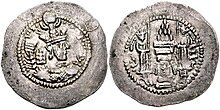441
Appearance
This article needs additional citations for verification. (October 2017) |
| Millennium: | 1st millennium |
|---|---|
| Centuries: | |
| Decades: | |
| Years: |
| 441 by topic |
|---|
| Leaders |
| Categories |
| Gregorian calendar | 441 CDXLI |
| Ab urbe condita | 1194 |
| Assyrian calendar | 5191 |
| Balinese saka calendar | 362–363 |
| Bengali calendar | −152 |
| Berber calendar | 1391 |
| Buddhist calendar | 985 |
| Burmese calendar | −197 |
| Byzantine calendar | 5949–5950 |
| Chinese calendar | 庚辰年 (Metal Dragon) 3138 or 2931 — to — 辛巳年 (Metal Snake) 3139 or 2932 |
| Coptic calendar | 157–158 |
| Discordian calendar | 1607 |
| Ethiopian calendar | 433–434 |
| Hebrew calendar | 4201–4202 |
| Hindu calendars | |
| - Vikram Samvat | 497–498 |
| - Shaka Samvat | 362–363 |
| - Kali Yuga | 3541–3542 |
| Holocene calendar | 10441 |
| Iranian calendar | 181 BP – 180 BP |
| Islamic calendar | 187 BH – 186 BH |
| Javanese calendar | 325–326 |
| Julian calendar | 441 CDXLI |
| Korean calendar | 2774 |
| Minguo calendar | 1471 before ROC 民前1471年 |
| Nanakshahi calendar | −1027 |
| Seleucid era | 752/753 AG |
| Thai solar calendar | 983–984 |
| Tibetan calendar | 阳金龙年 (male Iron-Dragon) 567 or 186 or −586 — to — 阴金蛇年 (female Iron-Snake) 568 or 187 or −585 |

Year 441 (CDXLI) was a common year starting on Wednesday of the Julian calendar. At the time, it was known as the Year of the Consulship of Seleucus without colleague (or, less frequently, year 1194 Ab urbe condita). The denomination 441 for this year has been used since the early medieval period, when the Anno Domini calendar era became the prevalent method in Europe for naming years.
Events
[edit]By place
[edit]Byzantium
[edit]- Chrysaphius, chief minister, persuades Emperor Theodosius II at Constantinople to dismiss his sister Pulcheria, for her policy of exiling the Jews, and destroying their synagogues.[1]
- Theodosius II sends the Eastern imperial fleet, under the command of the Romano-Goth Areobindus, into Sicilian waters, taking the Vandals by surprise.
- Pulcheria leaves for the seaport Hebdomon (Turkey), and becomes a nun to support Nestorianism in the Holy Land (Palestine).
- The Huns, led by Attila, attack Constanţa (modern Romania), one of the few remaining Roman forts on the northern bank of the Danube, and designated as a secure trading post. On a crowded market day, the Huns take the town by surprise and slaughter the garrison.[2]
Europe
[edit]- German Saxons establish themselves at the mouth of the Thames River. After a period of peace, Vortimer (son of king Vortigern), defeats the Saxons in four battles in Kent (according to the Anglo-Saxon Chronicle).
- King Hermeric dies after a two-year illness; he is succeeded by his son Rechila, who becomes sole ruler over the Suebic Kingdom of Galicia.
- Rechila invades Baetica and conquers the capital Seville. The Romans are driven from the Iberian Peninsula with the exception of the Levante.[citation needed]
- November 8 – The first Council of Orange is convened under the guidance of Hilary of Arles in Orange (France).
Persia
[edit]- King Yazdegerd II of Persia signs a peace treaty after a short war with the Eastern Roman Empire. Theodosius II sends his commander, Anatolius, to conclude his terms and promise not to build any new fortifications along the border territories.
By topic
[edit]Religion
[edit]- Domnus II succeeds his uncle John as Patriarch of Antioch.
Births
[edit]Deaths
[edit]- Hermeric, king of the Suebi
- John, Patriarch of Antioch
References
[edit]- ^ Elton, Hugh (2018). "The Early Fifth Century, 395–455". The Roman Empire in Late Antiquity: A Political and Military History. Cambridge: Cambridge University Press. pp. 151–194. doi:10.1017/9781139030236. ISBN 978-0-521-89931-4.
- ^ The End of Empire. Christopher Kelly, 2009. ISBN 978-0-393-33849-2
